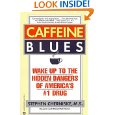|
Caffeine In CoffeeCaffeine in Coffee, Chemically, it is an alkaloid belonging to the class of organic compounds called methylxanthines chiefly derived from plants. Together Caffeine and coffee act as potent stimulants. The caffeine in coffee particularly stimulates the central nervous system (brain), skeletal muscles of the heart and the respiratory systems as well as delays fatigue. That is why you feel so refreshed and revitalized after sipping into your cup of Joe! Caffeine has a characteristically strong and bitter taste. This bitterness adds the punch that gives you a high and helps you feel so relaxed! However, as too much of everything is bad for your health, the combination of caffeine in coffee is no exception and can have serious negative impacts on your overall health. Therefore you need to restrict your intake of the caffeine in coffee to healthy limits. Caffeine in coffee has also been shown to possibly help asthma sufferers. The stimulatory effects of the caffeine in coffee affects the respiratory system in a positive manner. A few cups of coffee sometimes helps to spontaneously clear out blocked air passages. One great use of this knowledge is in emergency situations where an inhaler is unavailable. Just don't use this as a normal routine for helping with your asthma. But it can come in handy when you are unable to breathe and need immediate results. Diabetes is unfortunately becoming much too common. My daughter acquired diabetes when she was twelve, and it has been a struggle for her ever since. So you might find it interesting to know that Caffeine in coffee research has shown the risk of developing Type 2 Diabetes is reduced with the consumption of caffeinated coffee. Another disease that is prevalent today is Parkinson's. Unfortunately for my family, my mother has developed Parkinson's disease. But Caffeinated Coffee has been shown by research to have a protective function of reducing the development of Parkinson's. Just remember, these Coffee and Caffeine studies are ongoing, and not all coffee drinkers will get the same benefits. This is because like with any other drug, everybody's body reacts differently to various chemical elements. One thing you want to be very careful of as you do with any type of stimulant or drug is overuse. Caffeinated coffee can cause serious health related problems such as anorexia, tremors/seizures, restlessness, nervousness, insomnia, etc. I can personally attest to this as I have in the past over indulged in caffeinated beverages, and have had great difficulty with sleeping. The other problem is when you are trying to reduce your intake after over-indulging, you are very prone to get horrible headaches. So if possible, you do not want to get addicted, use in moderation only. 150mg/kg or more daily would be considered over consumption of caffeine. You should be advised that if you are prone to cardiovascular disease and heart problems that you should avoid consumption entirely. Research also shows that caffeinated coffee increase the risks of having a miscarriage and fetal defects. So it would be advisable if you are pregnant to avoid or at the very least significantly reduce consumption. Caffeine Blues: Wake Up to the Hidden Dangers of America's #1 Drug Often Purchased Together The World of Caffeine: The Science and Culture of the World's Most Popular Drug Often Purchased Together The Truth About Caffeine : How Companies That Promote It Deceive Us and What We Can Do About It Often Purchased Together Often Purchased Together Often Purchased Together Post Your Submission HereIf you would like to write a review please fill in the form below. For questions please be specific. If asking a question on merchandise, please give as much information as possible. Such as the brand, make, model, where purchased, etc. What Other Visitors Have SaidClick below to see comments & reviews from other visitors to this page...
Safest Decaf Coffees Not rated yet
|

Custom Search









